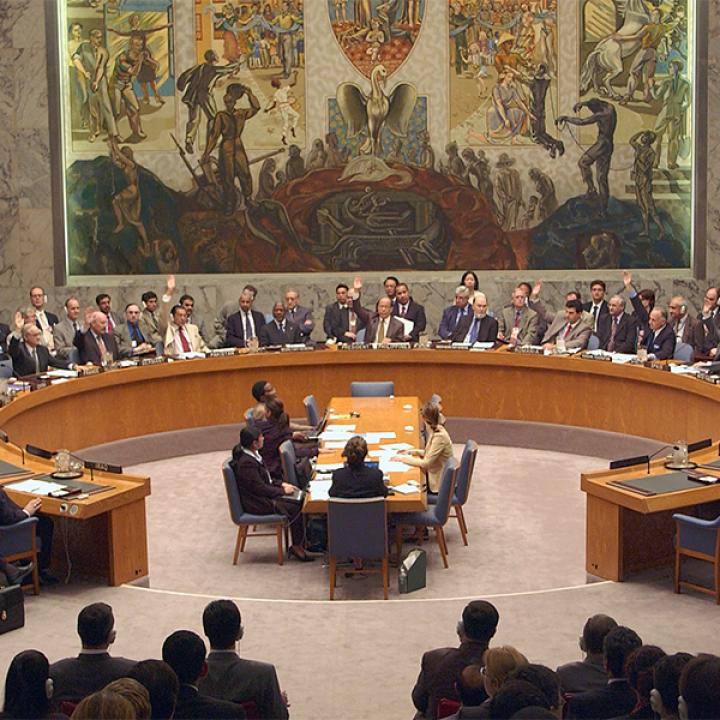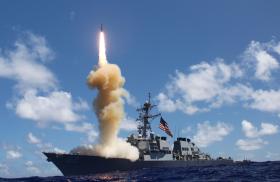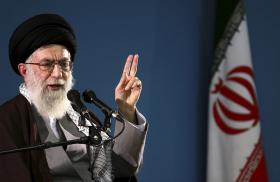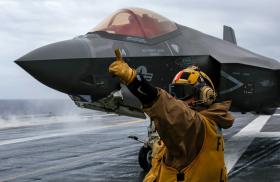
- Policy Analysis
- PolicyWatch 4097
Will Renewed UN Sanctions Bring Iran Back to the Table?

Reimposing old sanctions may not have much economic impact if China sidesteps them, but Washington could still use the mechanism to pressure Iran on returning to negotiations.
In high-level talks in Geneva on August 26, France, Germany, and the United Kingdom repeated the warning they sent to Iran on August 8: “We are equally ready, and have unambiguous legal grounds, to notify the significant non-performance of [Joint Comprehensive Plan of Action] commitments by Iran as foreseen under UNSCR 2231 (2015), thereby triggering the snapback mechanism, should no satisfactory solution be reached by the end of August.” The threat of reimposing UN sanctions that were suspended a decade ago by the JCPOA has taken on great political and symbolic importance to Tehran of late. Rarely a day goes by without prominent Iranian politicians fulminating against “snapback.”
The volume of Tehran’s noisy opposition is strategically curious given Europe’s evident determination to press ahead with this measure, suggesting that the regime is belaboring the point in order to publicly justify a move it already wanted to make—namely, reducing cooperation with international nuclear inspectors and suspending or even withdrawing from the Nuclear Nonproliferation Treaty. In any event, what impact would triggering the JCPOA’s snapback mechanism actually have on Iran’s economy and nuclear activities?
Snapback and the Nuclear Deal
Backed by UN Security Council Resolution 2231, the 2015 nuclear deal suspended the sanctions imposed by Resolutions 1737, 1747, 1803, and 1929 but noted that they can be automatically reimposed if China, France, Germany, Russia, or the United Kingdom informs the Security Council president that Iran has violated the nuclear deal—which it most certainly has, repeatedly. The first Trump administration tried to trigger the mechanism in 2020, but the council concluded that Washington had lost that power when it left the JCPOA two years earlier.
The UN sanctions in question imposed an arms embargo on Iran, froze the assets of numerous individuals and entities (including the Islamic Revolutionary Guard Corps and Islamic Republic of Iran Shipping Lines), and prohibited trade and financial transactions related to the regime’s nuclear and missile programs. The sanctions also included language urging states to exercise caution on several issues, essentially providing the basis for many countries in the EU and elsewhere to ban a broad range of activities with Iran, including oil trading.
Snapback This Week?
Under the terms of Resolution 2231, the snapback authority permanently expires October 18, which in practice means that a complaint would need to be filed by the end of August. This de facto early deadline has arisen because complicated procedures under 2231 require a thirty-day window, and Russia will take over the rotating council presidency on October 1—a post that it would almost certainly use to obstruct the measure.
For now, Moscow is drafting a resolution to extend the snapback expiration date by six months, but it would limit the circumstances under which snapback could occur. Moreover, in discussions with Iran, the European troika noted that any such extension would require the regime to accept unhindered inspections by the International Atomic Energy Agency, resume indirect negotiations with Washington, and account for the 400 kilograms of 60% enriched uranium in its stocks before the June military strikes by Israel and the United States—conditions that Tehran rejected. Iranian officials are now trying to undermine the legitimacy of a seemingly inevitable snapback by claiming that the nuclear deal has lapsed, so the mechanism cannot be invoked.
The Trump administration should be gratified that snapback is seemingly going to happen without it lifting a finger. Indeed, U.S. silence on the matter highlights the leading role European countries have taken in pressuring Iran—a perception that serves U.S. interests well. Their actions demonstrate that the central problem in the Iranian nuclear file is Tehran’s aggressive pursuit of dangerous capabilities, not Israeli and U.S. military strikes against those capabilities. At a time when many are eager to criticize Jerusalem and Washington, it is reassuring to find Berlin, London, and Paris focusing on the real bad actor here: Tehran.
Economic Impact?
Iran’s economy is in particularly poor shape right now. Electricity shortages and extreme heat waves have forced authorities to shut government offices and schools for one or two days a week in most of the country, while industry has been forced to curtail power use in the evenings and is not allowed to run generators at that time either. Another factor behind the shutdowns is air pollution from using dirty fuel to generate electricity. In addition, water shortages are forcing many urban dwellers to ration drinking supplies and forgo regular washing. The persistent inflation stemming from massive budget deficits has grown so bad that the government is actually pleased whenever it dips below 40%.
Given this litany of problems, would snapback be the straw that breaks the camel’s back? Possibly, but this outcome is by no means clear. The world has moved on since the original UN sanctions: Russia, China, and other countries are more skeptical about honoring sanctions imposed by third parties, and Iran has become adept at evading them. Moreover, the Western industrialized countries that are most likely to care about observing UN mandates do not trade much with the Islamic Republic. The EU reported $2 billion in imports from Iran last year (about half goods and half services) and $5.4 billion in exports (80% goods, 20% services), with much of this trade volume comprising items not covered by snapback. The United States reported $6 million in imports from Iran and $90 million in exports. Even Tehran’s trade with strategic partner Moscow is relatively small: Russian imports were $700 million in 2023, while its exports were $1.5 billion.
Chinese trade with Iran is the big issue. Trade data are not particularly reliable—a problem exacerbated in this case because both countries take pains to conceal Iranian oil sales to China. Yet according to the WITS platform run by the World Bank, UN, and World Trade Organization, 60% of the goods that Iran exported in 2023 were either to China ($22 billion) or unspecified countries ($25 billion), while 27% of its total $59 billion in imported goods came from these destinations. If snapback is triggered, it is unclear what, if anything, Beijing would do to curtail this trade. For one thing, the UN sanctions do not cover oil trading, and Chinese firms are already disguising the origins of most of the Iranian oil they import. But if the ripple effects of snapback do wind up impeding Iranian oil sales on the Chinese market—perhaps because banks, shippers, and insurance firms become more reluctant to handle such transactions amid heightened U.S. and European pressure—then Tehran would face a serious trade deficit and real government financing problems.
How Washington Can Shape Tehran’s Reaction
One option is to use snapback as leverage for bringing Iran back to the negotiating table. Toward that end, Washington and its allies could focus on making the reimposed UN restrictions more effective. Currently, Europe is better positioned to approach countries on this issue given the Trump administration’s many international disputes over tariffs and other matters. Yet it is unclear how much priority Washington or Brussels will assign to Iran sanctions in light of the other issues at play with the regime’s most important trading partner (e.g., Western disputes with China over rare earths, fentanyl, trade, and other matters).
The prioritization question is crucial because of the old adage among Iran experts: that Tehran does not react to pressure, it reacts to great pressure. Its 2013 return to nuclear negotiations was much influenced by the combined impact of U.S. unilateral actions and subsequent Western measures once the UN acted. Yet Tehran was also much affected by concern about possible Israeli and U.S. military action if it continued plowing ahead with its nuclear program. Indeed, the one-two punch of tough sanctions and prospective military action is what led Tehran to the table. Perhaps that will happen again.
The concern in Tehran is that snapback—and European campaigns urging others to go along—will highlight the regime’s lack of cooperation with nuclear inspections, providing an implicit justification for further military action. According to the local rumor mill, many Iranians are convinced that Israel has continued its covert actions inside the Islamic Republic and/or that full-scale hostilities could resume with little warning. In that sense, snapback may have much more of a political punch than an economic one—U.S. interests are best served by feeding Iranian paranoia about renewed fighting, and snapback can be part of that effort.
Patrick Clawson is the Morningstar Senior Fellow at The Washington Institute and director of its Viterbi Program on Iran and U.S. Policy.



